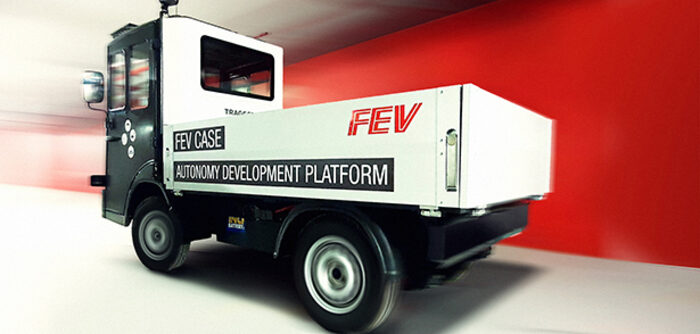Engineers at testing and development specialist FEV in Turkey say they have developed automated driving functions for the Tragger, a battery-electric service vehicle for cargo and people transportation in commercial and industrial settings.
In its original, non-autonomous state, the Tragger offers a load capacity of 700kg and the ability to tow as much as two tons. When loaded, the 3.1m-long vehicle can handle a gradient of up to 17% with a 2.8m turning circle. A full charge can be obtained in just six hours with a traditional mains current of 220V, and the swappable battery pack makes for efficient serviceability.
With their robust infrastructure, powertrain, suspension, brake and steering systems, the Tragger Pro series vehicles represented an ideal platform for FEV’s engineers to provide, install and calibrate hardware and software that ultimately will provide Level 4 automated driving features.
The sensor set used consists of seven lidar sensors, one radar device and one camera. Thanks to this setup, FEV says the vehicle can detect a 360° surrounding environment, separate moving objects up to 80m away and calculate the probability of collision. Thanks to the high-resolution camera and AI-based image processing algorithms, the ability to parse features such as lanes, pedestrians and obstacles allows the vehicle to move more safely in heavy traffic.
“New technologies are rapidly changing mobility, and here electrification, automated driving and connectivity elements stand out. Collecting experiences on the Tragger vehicle helped a great deal to accelerate R&D outputs,” said Taner Göçmez, MD of FEV Turkey. “Also, FEV Turkey used Tragger vehicles for the development of highly automated driving functions to enable vehicle self-operation in a geo-fenced area. In addition, a wide range of Level 2 functions are in focus. These include advanced emergency braking, adaptive cruise control with stop-and-go function, lane-keeping assistant, blind-spot detection, parking assistant and forward collision warning.”
Autonomous driving tests of the prototypes are scheduled to take place in Bilişim Vadisi, Turkey. Thanks to the software infrastructure and FEV-designed connection module, the vehicle will be controlled via an internet-based network and critical data will be collected in a cloud environment.
“After developing automated driving functions for several other automotive and commercial applications, the Tragger vehicle project aligns perfectly with our goal to advance safe, sustainable, easy-to-operate mobility solutions,” continued Göçmez. “This is an excellent example of leveraging global resources to enhance technological capabilities in Turkey.”


